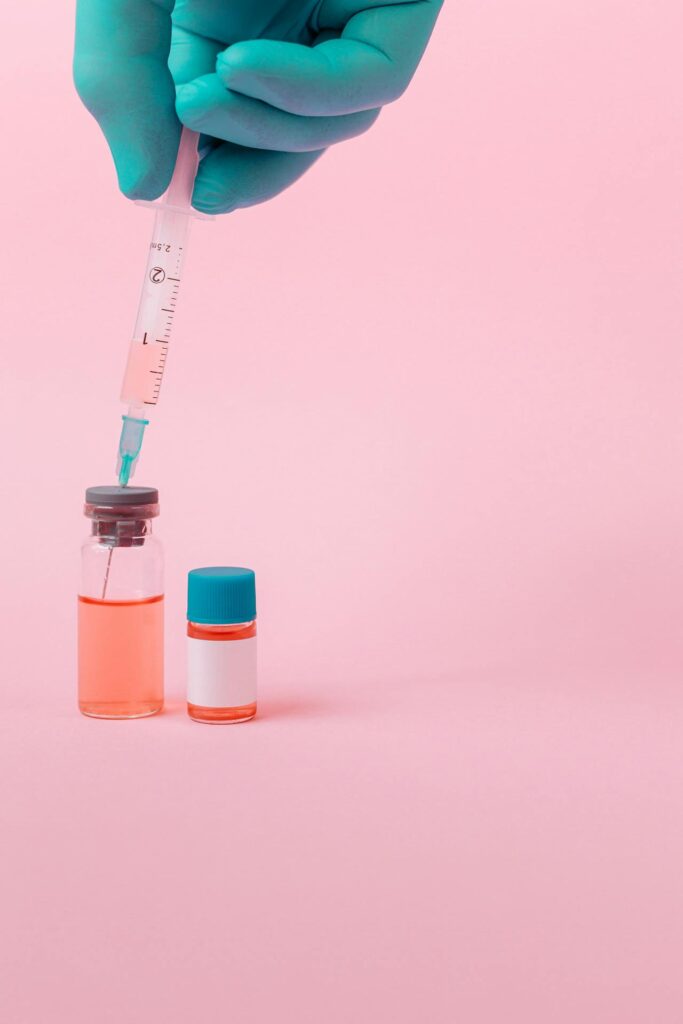Sun exposure and foods with healthy fats, like salmon, are great sources of Vitamin D, but when your body can’t absorb this nutrient from available sources, injections can help reverse vitamin deficiency and help restore your overall health. Wondering if an intramuscular injection can get you back on track? Join us for everything you need to know about these fast-acting supplements.
Why do we need Vitamin D?
Vitamin D is an essential nutrient that supports increased muscle function, robust immunity, and calcium absorption for better bone health. Let’s explore the basics of Vitamin D injections to supplement low levels:
What are Vitamin D injections?
Vitamin D injections include high dosages of D2 (ergocalciferol) or D3 (cholecalciferol) administered directly into muscle tissue. They’re used for people who need to increase vitamin levels rapidly, and those with problems absorbing vitamins in a pill or tablet form. Because injections bypass the digestive system, they don’t rely on absorption in your gut.
How do vitamin injections work?
Once the supplement is injected, Vitamin D will be stored in your adipose tissue and slowly released over time. This provides a steady supply of nutrients over several weeks or months. Due to the fat-soluble nature of Vitamin D, injections are preferred over IV therapy.
Are there side effects to Vitamin D injections?
Minor side effects include pain at the injection site and headaches. In rare cases, such as when dosing is improperly monitored, these shots can increase the risk of kidney stones, excess thirst, and hypercalcemia.
Related: Your Guide to Peptide Injections for Health and Wellness
What are the benefits of Vitamin D injections?
If you have low energy levels or poor mood, there’s a chance that regular Vitamin D injections can help. Let’s explore the benefits of these injectables:
Boost immune function
Vitamin D is an immunity powerhouse, helping white blood cells fight pathogens, inhibiting chronic inflammation, and mitigating autoimmune diseases like multiple sclerosis and rheumatoid arthritis. Injections are given in higher doses, giving your immune system a faster boost than a pill can provide.
Balance mood
Studies have shown links between Vitamin D deficiency and depression, so it makes sense that a fast-acting IV therapy session can support a healthy mental state. This vitamin influences serotonin production (your brain’s feel-good neurotransmitter) and enhances neuroplasticity for better emotional regulation.

Support cognitive function
By reducing neuroinflammation, supporting nerve growth, and improving detoxification pathways in the brain, Vitamin D may help improve memory, focus, and overall brain function. It’s possible that maintaining optimal levels of this nutrient can minimize the risk of cognitive decline and dementia in aging populations.
Maintain bone and cardiovascular health
Your body must have access to an adequate amount of Vitamin D in order to absorb calcium phosphate, the mineral responsible for strong bones and teeth. Vitamin D also helps regulate blood pressure, glucose metabolism, and inflammation, potentially reducing the risks of heart disease.
Related: How Injectable Platelet-Rich-Plasma (PRP) Helps Your Overall Health
How to tell if you need Vitamin D injections
Are you intrigued yet? Clearly, Vitamin D injections are a great solution for people with low levels of this nutrient. We have a few tips to help you determine if they’re right for you:
Assess any risk factors
Some people are more likely to be deficient in Vitamin D than others. Here are a few risk factors that may interfere with absorption:
- Limited sun exposure: Those living in northern climates or overcast environments, or limited time outside during the day.
- Dark skin color: High melanin reduces Vitamin D synthesis.
- Older age: Reduced skin productivity and kidney function to process Vitamin D.
- Digestive issues: Celiac disease, Crohn’s, and IBS can impact absorption in the gut.
- Obesity: Increased adipose storage can sequester fat-soluble vitamins.
- Kidney or liver disease: May impact the metabolism of Vitamin D.
- Certain medications: Steroids, anticonvulsants, and weight-loss drugs may affect absorption.
Be aware of any symptoms
While some people with Vitamin D deficiency are asymptomatic, others may experience:
- Fatigue or low energy levels
- Bone or muscle pain
- Frequent illness or infection
- Depression or mood changes
- Thinning hair
- Slow wound healing
- Weakness or muscle cramps
Get blood tests
Before you leap to Vitamin D injections as a first line of defense against fatigue, poor mood, and low immunity, it’s essential to know your baseline blood levels. Your healthcare provider can perform a simple blood test to determine if you’re deficient in Vitamin D or other critical nutrients like B12, iron, and so on. Here’s a quick guide to help you interpret your results:
- >100 ng/mL: Potentially toxic
- 30-50 ng/mL: Normal
- 20-29 ng/mL: Insufficient
- <20 ng/mL: Deficient
Related: Should You Consider Kenalog Injections? Use, Side Effects and More
Explore your health and wellness options at The Wellness Club!
At The Wellness Club, we take a holistic approach to anti-aging, helping our clients achieve a radiant, youthful glow inside and out. Ready to find out if Vitamin D injections can help you boost your energy levels, mood, and overall health? Schedule a consultation today to get started!

